|
In a statement today, Hon. Mélanie Joly said “our support for the ICJ does not mean that we accept the premise of the case brought by South Africa."
This is not surprising to anyone who is aware that Canada itself is an ongoing settler colonial entity that long abandoned their obligations to prevent racial violence and genocide at home or overseas. True justice, liberation, and the pursuit of truth and reconciliation are not going to come from the establishment. Instead, these ideals are likely to materialize through the influential force of social movements and sustained efforts by individuals of conscience. TAKE ACTION TODAY! Tell Canada to uphold the ICJ Ruling & Stop Arming Genocide! We need to make sure that the Canadian government feels overwhelming pressure to abide by international law. We need thousands of people to email and call their representatives and demand that they impose an arms embargo effective immediately.
0 Comments
Join us for a compelling dialogue as we delve into the intersections of Diversity, Equity, and Inclusion (DEI) amid one of the most urgent humanitarian crises today—the ethnic cleansing and genocide in Gaza, Palestine.
Rooted in the 1960s American civil rights movements, the modern DEI movement gained momentum as marginalized groups championed equal rights and representation. Despite the corporate world embracing DEI and anti-racism in 2020, recent industry layoffs and the stark challenge practitioners face in defining their role in regards to Palestine raise concerns. As we navigate through the complexities of the ongoing aggression from Israel, our discussion seeks to create a space for understanding and exploration of how historical DEI principles can contribute to a more inclusive and just world. The event will feature expert speakers, a panel discussion, and a Q & A session. Join us on Wednesday, January 17, 2024 (5PM PST / 6PM MST / 7PM CST / 8PM EST) via LinkedIn Live or YouTube Live. Speakers: Dr. Ed Hasan is a Palestinian-American and Muslim author, speaker, and professor. He is the Founder and CEO of Kaizen Human Capital and an Adjunct Professor at Georgetown University, where he received the Tropaia Outstanding Faculty Award. He recently published a book entitled Embracing Workplace Religious Diversity and Inclusion: Key Challenges and Solutions. Selam Debs is a Black Ethiopian antiracism educator, an anti-oppression coach, a social justice advocate and creator of The Antiracism Course. Selam is also a yoga & meditation teacher, reiki master and holistic life coach. Her work is focused on the art of activism and healing, so that as we examine and dismantle systems of oppression, we also integrate healing methods for inner and outer liberation. You can learn more about Selam Debs on www.selamdebs.com and @selamdebs on IG Mira Stern is a queer white Ahkenazi Jewish mama, educator, actor, and DEI consultant. She is based in Yelamu/San Francisco, and her work is committed to undoing white supremacy and Zionism, while rooting in futures of community and sustainability. Support our mission for inclusive education!
We're striving to bring a free 6-week anti-racism e-course to all Canadians. Your vote can make it a reality. With enough support, we could secure $10,000, which will be entirely dedicated to developing and sharing this course. Let's join forces and spread the word to turn this vision into reality. Embracing free anti-racism education is a powerful step toward fostering inclusivity and mutual understanding in our society. Be sure to place your vote – one vote per device. 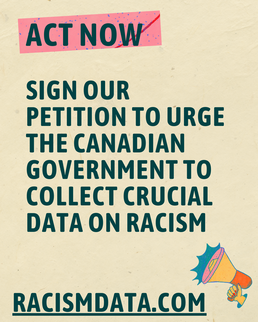 Friends, we URGENTLY need your help now more than ever before. For the past five relentless years, we have dedicated ourselves to the groundbreaking research study titled "This Act Does Not Represent Us." Our findings have unearthed a grim statistical reality: an overwhelming 96% of race-based hate in our nation goes unnoticed and unaccounted for, due to it’s non-criminal nature and lack of reporting. This demands an immediate response. We call upon the Government of Canada to hire an independent agency to collect national data on race-based hate incidents and their characteristics. Without the data, we're merely making assumptions. We cannot reform our systems or mitigate racism without collecting data on hate in order to better understand the issues. Data-driven and evidence-based policies should be the standard in Canada when we are looking to allocate resources wisely and create better outcomes for residents. We ask everyone to take 20 seconds of their day to sign and share our House of Commons petition as widely as possible. With an overwhelming show of support, we will compel the House of Commons to address this matter, leaving our government no choice but to take decisive action. Our collective efforts can make the seemingly impossible, possible. Time is of the essence – sign now at racismdata.com! Inaction is one of the most powerful forms of oppression. Our nation’s failure to collect adequate race-based data grants us to dismiss racism within our systems, and further works to actively promote a lack of transparency. Join us on Monday June 5 at 6PM MST for a live streamed discussion on the needs and solutions for race-based data in Canada. Centered around the recent five-year study looking at race-based hate incidents, Iman Bukhari from Canadian Cultural Mosaic Foundation, will be moderating the online event to hear from the panel about their perspectives. Panelists: Chad Haggerty has spent most of his life working in the criminal justice system. In his mid-30’s he chose to go to law school so that he could help the people that needed the benefit of his experiences most – people accused of crimes. Hagir Sail is a respected professional in the field of anti-racism and diversity, equity, and inclusion (DEI), with over 10 years of experience working in community development, police work, and social justice activism. Steven Ngo currently works as counsel at Rivian and was named one of Canada’s Top 25 Most Influential Lawyers by Canadian Lawyer Magazine. He is leading a movement called Fix Police Reporting that is focused on removing barriers to reporting hate crimes to the police. Keivan Monfared has a PhD in Mathematics and works as a Data Scientist with a personal interest in topics related to discrimination and equity. He is passionate about using data to inform and influence policies that directly impact underrepresented groups.
In June of 2020, we gathered over 70,000 signatures from Calgarians asking for the City of Calgary to address systemic racism. After three years, they have launched their anti-racism strategy.
The strategy is a good, safe start. However, the main aspect missing is what the Calgary Police Service will be doing to reform and address racism within their services. More than 60% of the people who came out to the public hearing spoke about experiencing racism from the Police. We have yet to hear from the Police on how they will hold themselves accountable. Furthermore, overall accountability is also a concern. Making a strategy document is not enough. The City of Calgary needs to hold themselves accountable. We want to see an independent organization evaluate the City’s execution of the strategy and measurements. Governments should not be the ones measuring their own success, or funding partner organizations to measure it on their behalf.
According to the Canadian Criminal Code, a hate crime is defined as a crime motivated by hate based on race, ethnic origin, language, religion, sex, age, mental or physical disability, sexual orientation, etc. A hate incident however is a non-criminal action committed against a person or property, the motive for which is based in whole or in part upon the same characteristics mentioned above. Because hate incidents are non-criminal in nature, police are limited in their ability to be involved. However, the harm caused by such incidents is both palpable and clearly pervasive.
Our national race-based hate data, provided by Statistics Canada, merely consists of police reported crimes. Even though most racialized and Indigenous peoples experiences are actually of hate incidents, not crimes. According to our five years study, only 4% of reports were actually deemed a crime, the rest were all incidents. The incidents are what happens day to day and what most people refer to when they say systemic racism. We cannot reform our systems or mitigate racism without collecting data on hate incidents in order to better understand the issues.
People from around the world cross land and sea to reach the promised land of Canadian multiculturalism and diversity — an international image that Canada eagerly promotes and prides itself on as one of its greatest strengths.
Beneath that veneer, however, is racism ingrained so deeply in Canadian society that it appears natural to the naked eye — normalized so extensively, since the first moment of colonial contact, that it is the prevailing factor in how people engage not just with their neighbours, but also with the institutions that run the nation. While Canadians may clutch their pearls in horror at the rawer, more physically violent forms of race-based hate incidents, the daily experiences of racialized and Indigenous peoples are obscured behind the veil of purported multiculturalism. So what does racism in Canada really look like? This first-of-its-kind research project seeks to answer this question by tracking and collecting data on race-based hate incidents reported by mainstream, English-language media sources in Canada. Over a five-year period (2018-2022), Canadian Cultural Mosaic Foundation collected and analyzed race-based hate incidents, creating a unique data set that begins to paint a fuller picture of interpersonal, systemic and other forms of racism across the nation. The research illustrates characteristics such as frequency and locations of incidents, ethnicities targeted, intersectionalities (religion, gender identity, sexuality, etc.) and more. This unprecedented data set highlights the varied nature and complexity of race-based hate incidents perpetrated against racialized and Indigenous peoples in Canada as reported by the media. The harm caused by such incidents is both palpable and clearly pervasive. As such, we are sharing our data with researchers, governments and institutions to build towards a more equitable future for all Canadians. We hope this data will inspire more Canadians to advocate change locally in their respective communities. Our dashboard houses all data collected, including links to the original media sources with the option to download raw data for further analysis.
Snapshot of the data
This unique race-based data set begins to paint a fuller picture of interpersonal, systemic and other forms of racism in Canada, through incidents in:
The above findings illustrate the profound way in which racism is deeply woven into the foundational fabric of Canadian society — with far-reaching and devastating implications. These are the areas we must focus on for reform.
Call to Action
Government policies and practices currently in place to address racism are insufficient, at best. Our primary purpose for this study has always been to highlight the critical need for nation-wide data on race-based hate incidents to drive necessary anti-racist reform. Canada must become a data-driven country to improve equity and outcomes for racialized and Indigenous peoples, thereby creating transparency so all Canadians understand the importance of anti-racism work in Canada. We ask the Government of Canada to hire an independent agency — not Statistics Canada or law enforcement/policing organizations, due to broken trust in racialized communities — to collect national data on race-based hate incidents and their characteristics. As previous initiatives have failed due to government agendas and lack of funding, it is paramount that this work is data-driven and done in partnership with provincial and municipal governments, but without interference from any governments, including law enforcement or the wider justice system. The independent agency must receive adequate, ongoing funding (separate from Canada’s Anti-Racism Strategy budget), in order to collect data as trends evolve over time, and a comprehensive understanding of anti-racism pedagogy. While our study is urging one major recommendation — for the federal government to hire an independent agency to collect nation-wide data on race-based hate incidents — we encourage policy-makers to use our data to generate further recommendations in areas such as politics, government services, media, policing, education, sports, workplaces, businesses, online and other industries/sectors where racialized Canadians are negatively impacted. This spring, we are pleased to be hosting the 2022 Anti-Racism Arts Festival in Regina online. Due to lack of funding, we will only be having one event, our film challenge! We anticipate this festival to inspire, teach and feature local artists to use creativity as a catalyst for change.
Dates: March 11 - 13, 2022 Time: 4:30 p.m. CST Venue: Online Teams of local amateur and professional filmmakers will be given 48 hours to write, shoot, and edit short films with the themes of anti-racism. Teams will be required to integrate a quote into their film that will be assigned to them. Online information packages for the film competition will be emailed out prior to the competition. Winners of the film challenge will receive monetary prizes and be announced on March 21 on our website. Check out films that have been created in the past: Calgary, Edmonton, Winnipeg, Vancouver, Nanaimo. No experience necessary, so get your team together and enter the challenge! Register today.
Racism creates a ripple effect of exceedingly detrimental impacts to individuals, communities, and the collective wellbeing of any given geographical or social region as a whole. Though all who experience racism are subject its negative and harmful effects, children are especially vulnerable to the consequences. As educators, it’s important to acknowledge that the events of our society, past and present, impact the practice and activities of our classrooms. Students are coming in with knowledge and experiences that are rooted in real life, and teachers must be reflective and responsive enough to create space for this knowledge and these experiences to be valued as learning. As worldwide conversations and actions are taking place to eliminate systemic racism, how can we not step back and reflect on teaching and instruction?
In celebration of the completion of our anti-racist education hub for K-12 teachers, Culture Commons, we are hosting an important dialogue about creating anti-racist schools. Join us on Monday, January 17, 6PM MST, as we speak to anti-racist educators involved in this active process of identifying and eliminating racism by changing systems, organizational structures, policies and practices and attitudes. This event will take place online via Facebook Live, YouTube Live, and Twitter Live. There will also be a livestream on our website (canadiancmf.com) available above. Host: Michelle Casten Magbanua is an elementary French teacher at Rocky View School Division with a Bachelor's degree in both Drama and Education. She believes that the role of education is to empower the youth, using her quirky and personable teaching style to instill a sense of open-mindedness and growth in her students. Michelle seeks to dismantle oppressive systems and create an anti-racist school system through the power of education. Panelists: Dr. Sonia Aujla-Bhullar is a scholar, researcher, and educator with a PhD in Curriculum and Learning. As a public-school teacher and published author, Dr. Aujla-Bhullar has studied and researched the unique aspects and challenges of inclusion and diversity within Canada through understandings of post-colonial and critical race theory in education. Her past and present work focuses on anti-racism as an institutional practice and applications of diversity, inclusion, and equity between schools and racialized communities. Courtney Walcott was elected Councillor for Ward 8 in Calgary during October of 2021. Previously, he was a teacher and basketball coach at Western Canada High School and a community organizer who worked on numerous anti-racism initiatives within education, including with our organization as a volunteer. Chantal Chagnon is a Cree Métis Singer, Drummer, Artist, Storyteller, Actor, Educator, Facilitator, Social Justice Advocate and Activist with roots in Muskeg Lake Cree Nation, Saskatchewan. She shares Traditional Indigenous Songs, Stories, Culture, History, Arts, Crafts and Teachings and has presented in numerous classrooms from preschool through university. Chantal is passionate about building awareness and sharing understanding of Indigenous culture, spirituality, social justice and political issues. About us: The Canadian Cultural Mosaic Foundation (CCMF) is an award-winning not-for-profit organization run by committed volunteer Millennials and Gen Z. We work to improve race relations in Canada by creating cultural understanding through education, technology and arts. Culture Commons is our newly created resource hub for K-12 teachers disrupting systematic racism, by promoting an anti-racist, multicultural, equity and inclusivity based lens in education within Alberta classrooms. (culturecommons.ca)  A first-of-its-kind online hub of no-cost educational resources promoting anti-racism in Alberta K-12 classrooms, created by the Canadian Cultural Mosaic Foundation (CCMF), launched September 14, 2021. Culture Commons offers thousands of lessons, activities and tools that teachers can use to incorporate anti-racism education directly into their teaching plans. Resources are available for all core K-12 subjects and options, and are linked to current Alberta curriculum outcomes. Culture Commons is piloting in Alberta with plans to expand country-wide. “Culture Commons empowers educators to teach about anti-racism and multiculturalism within their existing lesson plans through thousands of free resources that represent numerous cultures and ethnicities,” says Iman Bukhari, Founder and CEO of CCMF. “When students see themselves reflected in the course material, it helps to break down racist stereotypes while building a worldview that is more inclusive and equitable. We are calling on all provincial and the federal governments to help make this service available Canada-wide.” Culture Commons was created in response to CCMF’s research paper, Long Way To Go, which found that limitations in time, funding, accessibility and knowledge were some of the top challenges for teachers in teaching about multiculturalism or anti-racism. This is why Culture Commons was created to be free-of-charge with easy-to-use navigation and accessibility features, such as enabling the use of screen readers. “I used several resources about immigration from Culture Commons that were very meaningful and relatable for my class. It led to a great discussion and the stories paved a way to let students share and connect their own unique cultural experiences,” said Nikka Peredo, an elementary school teacher in Calgary. As Culture Commons’ library of resources continues to grow, CCMF is linking these resources to curricula country-wide over the next five years. Furthermore, CCMF will also be launching a free, online, six-week training course on anti-racism in 2022. For more information on Culture Commons, visit culturecommons.ca Media Inquires: For media inquiries, please contact us. About Canadian Cultural Mosaic Foundation: The Canadian Cultural Mosaic Foundation (CCMF) is an award-winning not-for-profit organization run by committed volunteer Millennials and Gen Z. We work to improve race relations in Canada by creating cultural understanding through education, technology and arts. Being on the forefront of advocacy our foundation often works with ethnic communities on programming. various intersecting identities and racial backgrounds, all whom are volunteers. For more information, please visit canadianculturalmosaicfoundation.com. Over the past year and a half, our awesome team member Courtney Walcott has spent countless hours volunteering on our team to help our educational anti-racist initiatives. He is now running for council in Ward 8 in Calgary. We asked him four questions about himself, his vision and how he will help build an anti-racist Calgary.
Check him out at http://courtneywalcott.com/ Send Prime Minister Trudeau a letter asking for accountability about residential schools in Canada6/2/2021 Content written by Evans Yellow Old Woman and Steven Crowchild. After the disturbing yet sadly obvious news about the remains of 215 innocent Indigenous children's bodies found at the former Kamloops Indian Residential School, here is a letter template addressed to Prime Minister Trudeau, that everyone can use asking his government to commit to action. Please add your information and send it to his office. Help us flood his mailbox in order to hold our government accountable. We encourage you to mail a letter in, but if that is not possible you can send via email: [email protected].
The Right Honourable Justin Trudeau, P.C., M.P. Prime Minister Office of the Prime Minister 80 Wellington Street Ottawa, ON K1A 0A2 To Prime Minister Trudeau, The discovery of the bodies of 215 innocent Indigenous children in a mass grave at the former Kamloops Indian Residential School is physical evidence of the genocide committed by the Canadian Federal Government against the Indigenous Peoples of Canada. This is the time for action and justice, no more empty platitudes and apologies without change. Justice must be served for these 215 innocent children and the countless other lives taken by the deliberate actions of the Canadian Government and Churches. The Federal Government of Canada has known of these atrocities not only through the work of Truth and Reconciliation, but because you have legislated and funded the institutions. It is the responsibility of this government to ensure the harm committed is amended. I am calling on the Canadian Federal Government to act now. We call on you, the leader of the Canadian Federal Government, to publicly commit to the following:
The Government of Canada can no longer deny the crimes of genocide committed against Indigenous Peoples. There can be no reconciliation without truth and action or it continues to be an injustice. Please do the right thing. Thank you, Rename the CBE Langevin Science School in order to stop honouring racist colonial policies5/31/2021 Help us promote the good work of the Change Langevin School committee focused on changing the name of the Bridgeland Science School in Calgary from Langevin, the residential school architect.
We are asking the Calgary Board of Education to immediately rename the “Langevin Science School” to the “Bridgeland-Riverside Science School” as a tangible step consistent with the commitment made in 2021 to “advance equity, anti-racism and inclusion” by the CBE CARES committee.[1] As described in existing policy documents, we also ask the CBE to convene a School Naming Committee and select a permanent name for this school consistent with the spirit of Truth and Reconciliation, and to do so in a manner that truly reflects the importance of honourable Nation-to-Nation dialogue. We believe the current name is inappropriate because Hector-Louis Langevin was a vocal proponent of colonial, assimilationist and genocidal policies towards Indigenous peoples. As a cabinet minister he said the following words, which continue to cause harm today: “The fact is if you wish to educate these children you must first separate them from their parents during the time that they are being educated. If you leave them in the family they may know how to read and write, but they still remains savages, whereas by separating them in the way proposed, they acquire the habits and tastes – it is to be hoped only the good tastes – of civilized people.”[2] He did not view Indigenous people as equals, and lead the implementation of racist policies at several levels including the establishment of the first Industrial Schools, the imposition of misogynistic non-traditional Band Council governance styles, and the creation of “Indigenous Status” definitions decided by the colonial government.[2,3] We believe expecting Indigenous students to walk into a school whose name honours a man who did such harm to their people is fundamentally inconsistent with the CBE’s responsibility to “provide safe and positive learning conditions […] that foster a sense of belonging and a respect for diversity”.[4] Honouring Langevin does not support Reconciliation. His name is inextricably linked to decades of intergenerational trauma which continues to affect Indigenous students, families and Canadian society as a whole. Non-Indigenous students are also failed by an educational system that refuses to acknowledge the whole truth of our history. A name change which honours the spirit and content of the Calls to Action contained in the Final Report of the Truth & Reconciliation Commission[5] is necessary to ensure the CBE's core belief that “public education serves the common good”.[6] We note that many distinct governments from across the country have recognized the importance of removing Langevin’s name from various landmarks since at least 2017. Calgary City Council’s chose to re-name the Reconciliation bridge (formerly Langevin bridge).[7] The Office of the Prime Minister changed the name of their offices, which were formerly known as the Langevin Block.[8] Ottawa City Council renamed Langevin road after Algonquin elder William Commanda, who served as Chief of the Kitigan Zibi Anishinabeg First Nation.[9] In this time of Reconciliation, we should be working together in a Nation-to-Nation way. Accordingly, and as required by CBE Governance policy[10], we expect the School Renaming Committee to engage in meaningful, transparent dialogue with all community stakeholders. We ask that Committee membership include representatives of the Niitsitapi Nations (Blackfoot), Tsuut’ina Nation, Nakoda (Stoney) Nations and Métis. 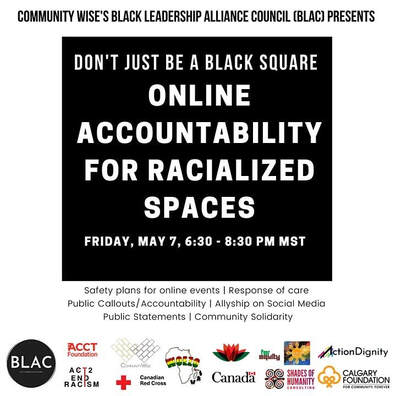 What does online accountability look and feel like? Go beyond the image and the doom scrolling to consider what it means to be accountable for racialized spaces online. Friday, May 7, we’re presenting another conversation online, that will be looking at just that - online conversations. We’re gathering and hosting online more than ever, the ways in which we treat each other, express ourselves are being seen by the masses. In an effort to build uplifting communities in online spaces for racialized communities are we doing enough? Are we all conscious of what we share, type and say on online spaces - probably not. When we’re not, how do we remain accountable and authentic to the racialized voices we’re trying to uplift. This conversation is for organizations, individuals, allies and anyone who is interested in curating an authentic online presence that demonstrates your actions towards racial equity. The conversation will be looking at various platforms, mediums and action or inaction where we can take better care of one another online. Topics of discussion:
The topics for discussion will help participants learn what accountability can feel like, create a community of care and how to centre the needs of racialized communities. Join us as we navigate the online space together and identify how we can become more accountable to make the change offline! Panelists:
This event will be hosted by CommunityWise on Facebook Live and will be accessible by email for participants the afternoon of May 7, 2021. BLAC wants to give an applause to those who are partnering with us for the conversation: Woezo Africa, bahaghari, Canadian Cultural Mosaic Foundation, CommunityWise, Calgary Foundation, ActionDignity, ACCT Foundation, Act2ENDRacism, Canadian Red Cross, Shades of Humanity, forEquity  The Calgary Police Service (CPS) would like to hear more from you on the School Resource Officer (SRO) Program! School Resource Officers (SROs) are law enforcement officers with the Calgary Police Service who are placed in elementary and secondary schools. You are invited to contribute your thoughts on the SRO program. Students and young people can:
Parents and Guardians can: - Join this webinar on Wednesday April 28 at 6pm MST https://us02web.zoom.us/webinar/register/WN_IxcBiZ7VT1ak_zxaSR-Sjg - Submit your thoughts through email by writing to [email protected] Teachers and School Staff can: - Join this webinar on Thursday April 29 at 6pm MST https://us02web.zoom.us/webinar/register/WN_o2bJhg1VQsyE8_GGjOr12A - Submit your thoughts through email by writing to [email protected] Your participation is important to helping to understand if the SRO program meets the needs of students and community. If you have any questions or concerns about participating, please reach out to [email protected]  Our members love working with ethnic communities on youth programming! In partnership with Pakistani Canadian Cultural Association (PCCA) and many others across Canada, we are proud to host the first ever Pakistani Canadian Youth Cultural Program online during the summer of 2021. We will be holding 13 different sessions for Pakistani youth across Canada to join and learn about their ethnic heritage to help build knowledge, pride and personal skills. This program is ideal for ages 12 – 30 and will be taught in a fusion of both English and Urdu. This program will not be political nor religious, as our aim is to be as inclusive as possible to all Pakistani youth. Date: Every Friday for up to two hours from June to August 2021 Time: 5PM PST / 6PM MST / 7PM CST / 8PM EST Online: Register here. Meeting will take place through zoom. We have limited spots available, we encourage everyone to sign up as early as possible. We encourage all participants to attend all sessions. These sessions will not be available on any other platform other than Zoom. Cost: This program is free, but registration is required. Schedule:
This program is made possible thanks to a small fund by The Genesis Centre in Calgary. Thank you! Organizers of an Anti-Racism Arts Festival say a recent cyber-attack on the event discussing race is highlighting the urgent need for anti-racism work.
On March 20, at the 2021 Anti-Racism Arts Festival, facilitated by the Central Vancouver Island Multicultural Society (CVIMS) and created by the Canadian Cultural Mosaic Foundation (CCMF), had one of the Zoom festival events hijacked with anti-Black, incredibly horrific racist comments, inciting the multiple use of the racist term, the N-word, that was directed to the panelist Wunmi Idowu. “As a panelist, I was not given the opportunity to share my story but the incident that followed spoke for me and highlighted the struggles of Anti-Black racism in Canada. What happened on Saturday highlighted the fact that there is a growing problem with Anti-Black racism in our community that needs to be addressed. It’s a global issue and people who live in Canada are affected by it everyday,” said Wunmi Idowu, panelist and Founder & Director of Woezo Africa Music & Dance Theatre Inc. This disturbing incident is an example of why anti-racism work is needed and a continued process. “This violent event of anti-Black racism exemplifies just how much more vulnerable the Black community members are to hate, ignorance and divisiveness when they are working in the very field meant to protect them. Wunmi, or any other community member, does not deserve this. There is a need for change,” said Iman Bukhari, CEO and Founder of Canadian Cultural Mosaic Foundation. The incident is being referred to as a "Zoom-bombing," a term used when people take over digital meetings and cause mayhem or post disturbing content. This incident also speaks to the magnitude of cyberbullying, and how systemic these concerns are as there is little accountability from multi-billion companies such as Zoom. According to ADL, it has been reported that more than 30 virtual events celebrating Black History Month and anti-racism events have been disrupted by racist attacks. Racist incidents during events online have become more pervasive, often even when organizers do what they can to put precautionary measures in place. "This was a violent, disruptive and traumatic event," said Jennifer Fowler, co-coordinator and Executive Director of the CVIMS. “I hope that others can learn from our experience, and many others who have experienced this. It is unfortunate that when planning anti-racism events, this is now something that organizers and facilitator’s need to be more prepared for.” The organizers condemn this incident, are putting in more safety measures for future events, and are investigating with law enforcement and Zoom. For more information contact: Wunmi Idowu (she/her) Founder & Director Woezo Africa Music & Dance Theatre Inc. Iman Bukhari (she/her) CEO & Founder Canadian Cultural Mosaic Foundation (CCMF) Jennifer Fowler (she/her) Executive Director Central Vancouver Island Multicultural Society Use our contact form to connect with the folks above. More hate-filled incidents over the weekend in Alberta, all happening in broad daylight. It’s a concerning trend for the province, one that has some experts warning Alberta is developing a racist reputation. And if some people can’t feel safe walking down the street, could it drive them away altogether?
“People are leaving this province for a reason,” said Iman Bukhari, the CEO of the Canadian Cultural Mosaic Foundation. “People don’t want to come to this province, in particular, minority groups won’t want to come as they hear more and more about this.” We're partnered up with Black Voters Matter Canada to build Black political power and a community of support. We know that Black people are often underrepresented as candidates, elected officials and generally are disengaged with the political process itself and we want to change that.
Black Voters Matter Canada are a collective of Western and Northern-based Black community members who are keen to engage, encourage and empower more Black People to be involved in all levels of governments and politics. For our event series, we have confirmed all major federal political parties (Liberal, NDP, Conservative Party and Green Party) to participate and a final event showcasing the leaders and importance of Black Women in politics. This federal election series hopes to:
Click the images below to direct you to the free event links. |
Archives
January 2024
|
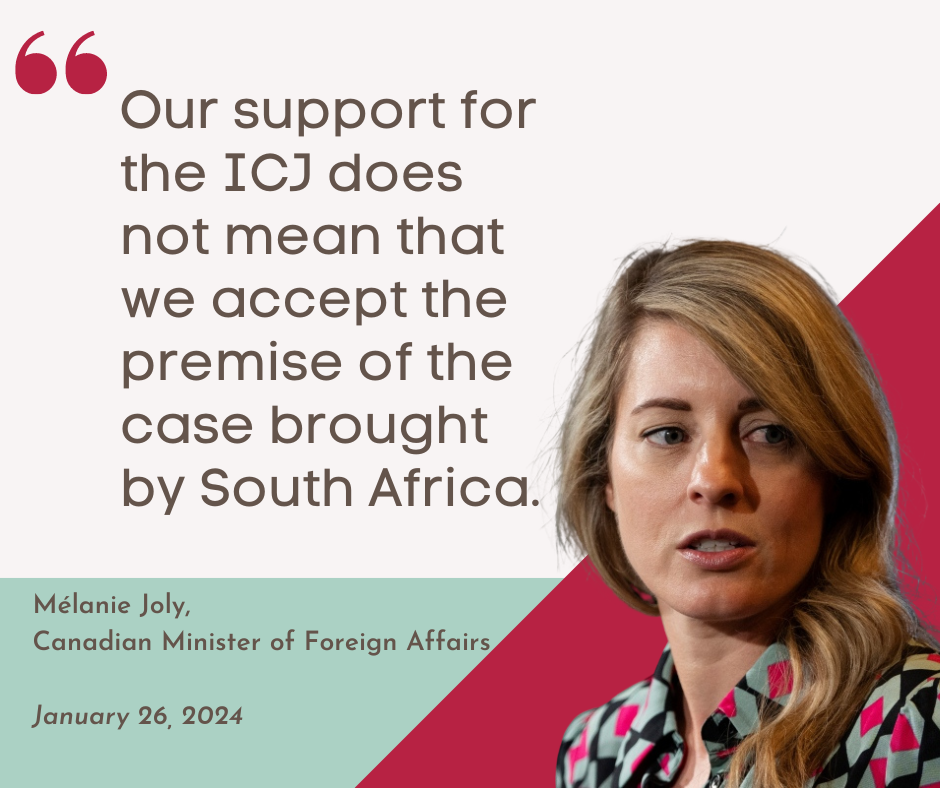
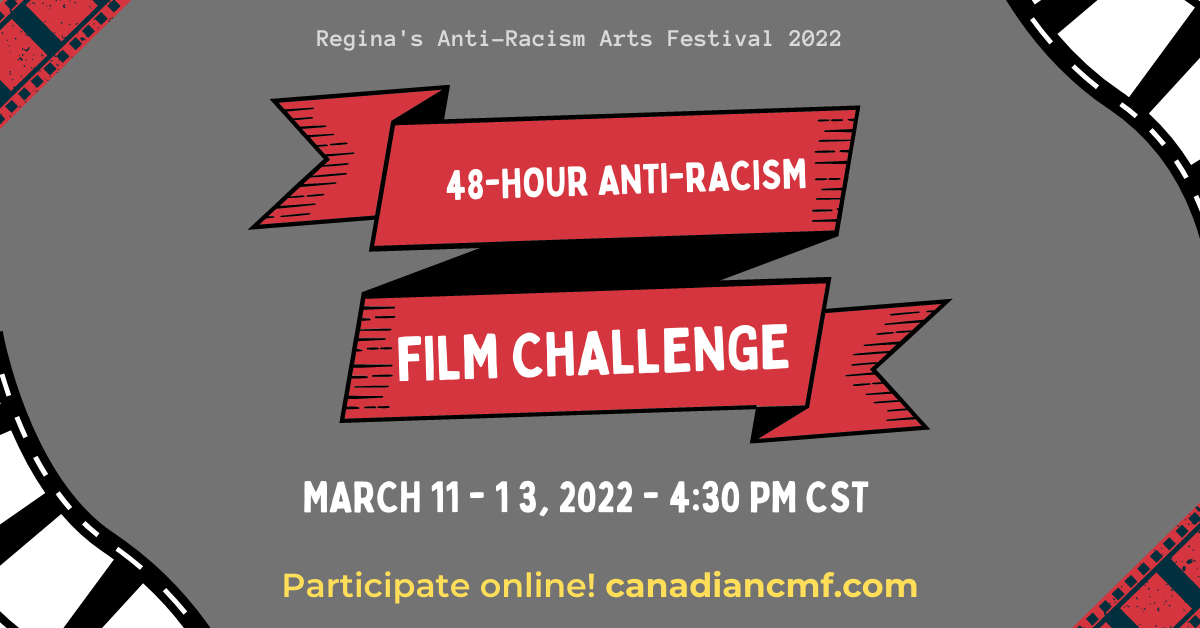
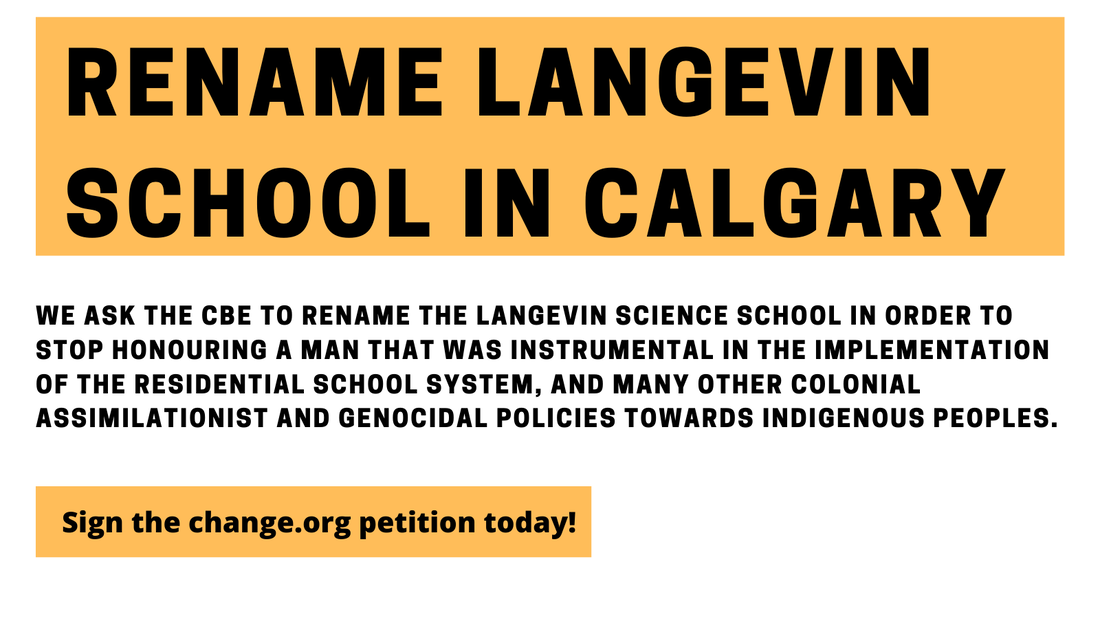
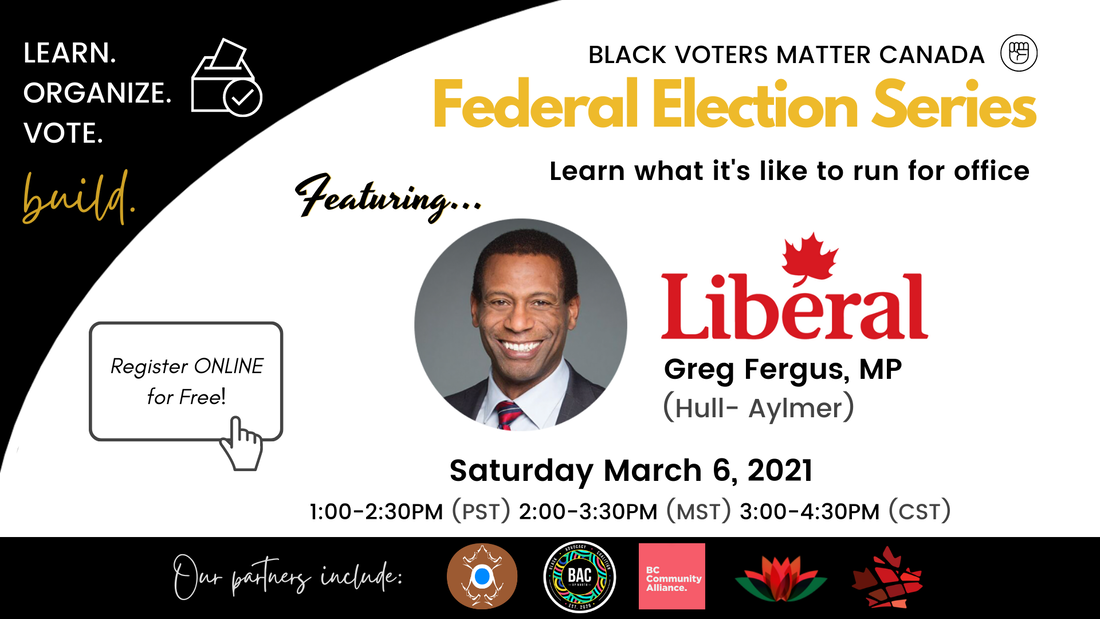
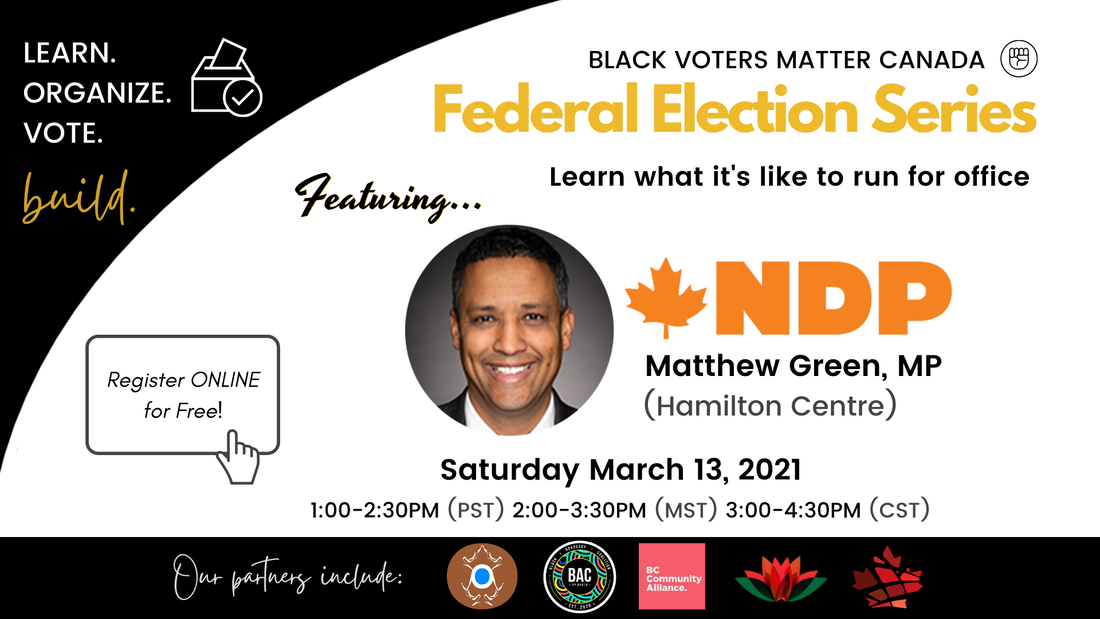
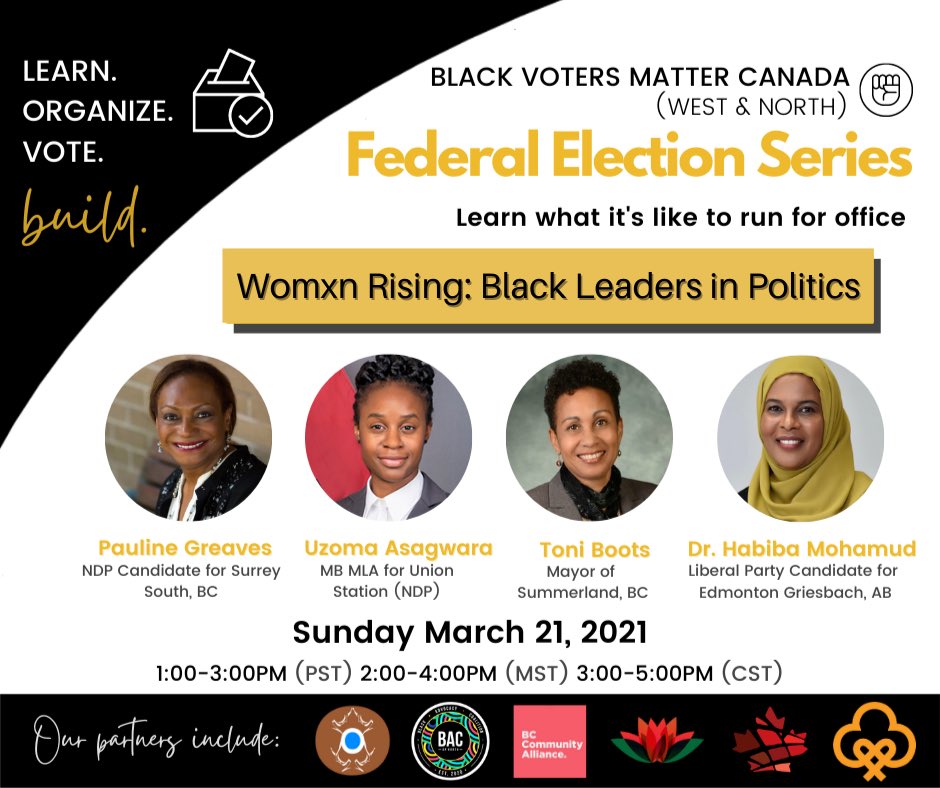
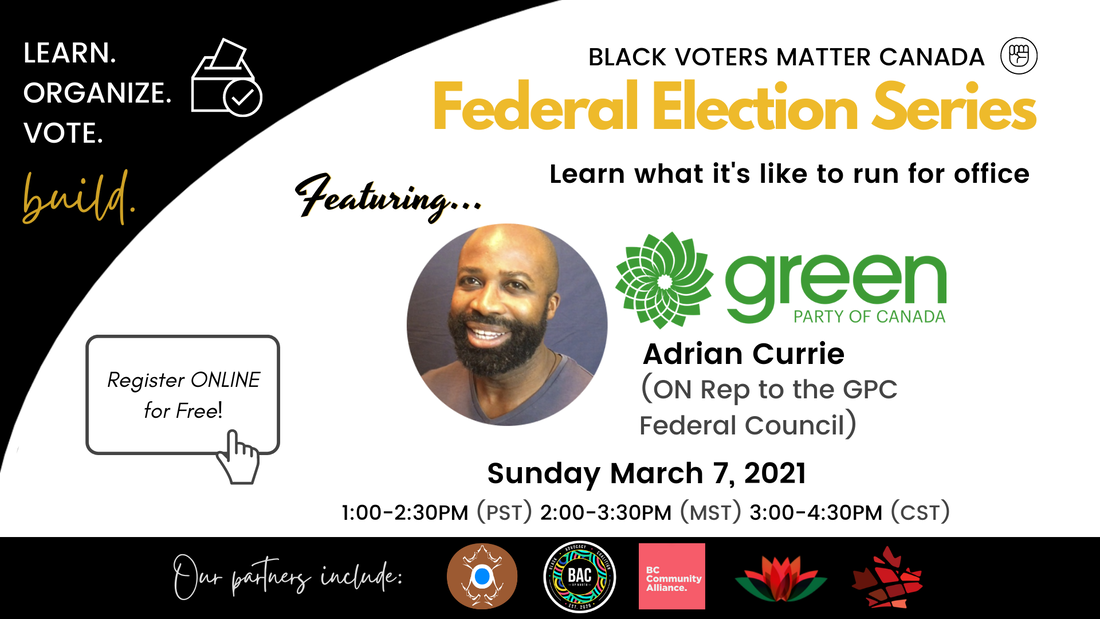
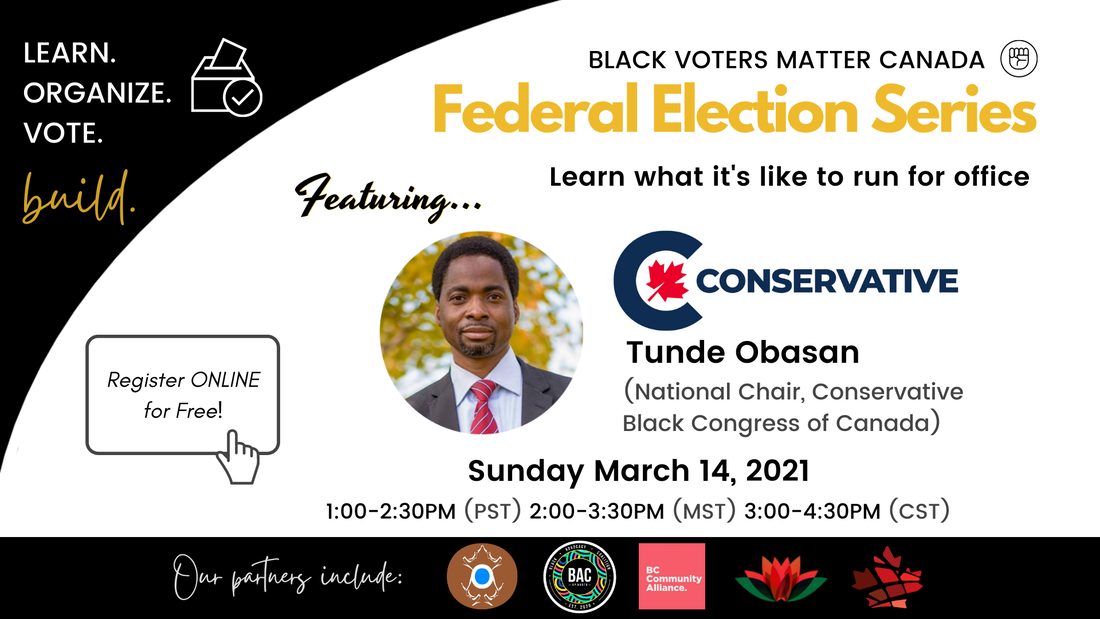
 RSS Feed
RSS Feed
